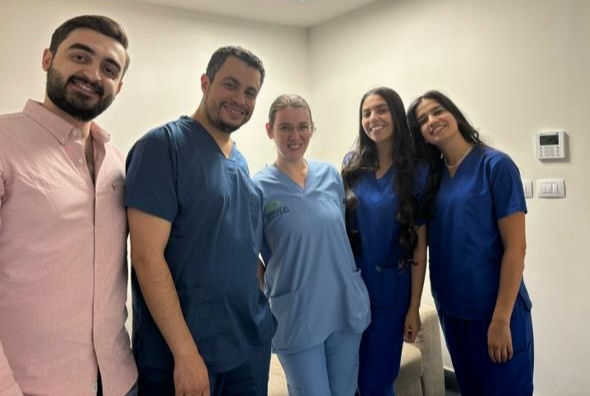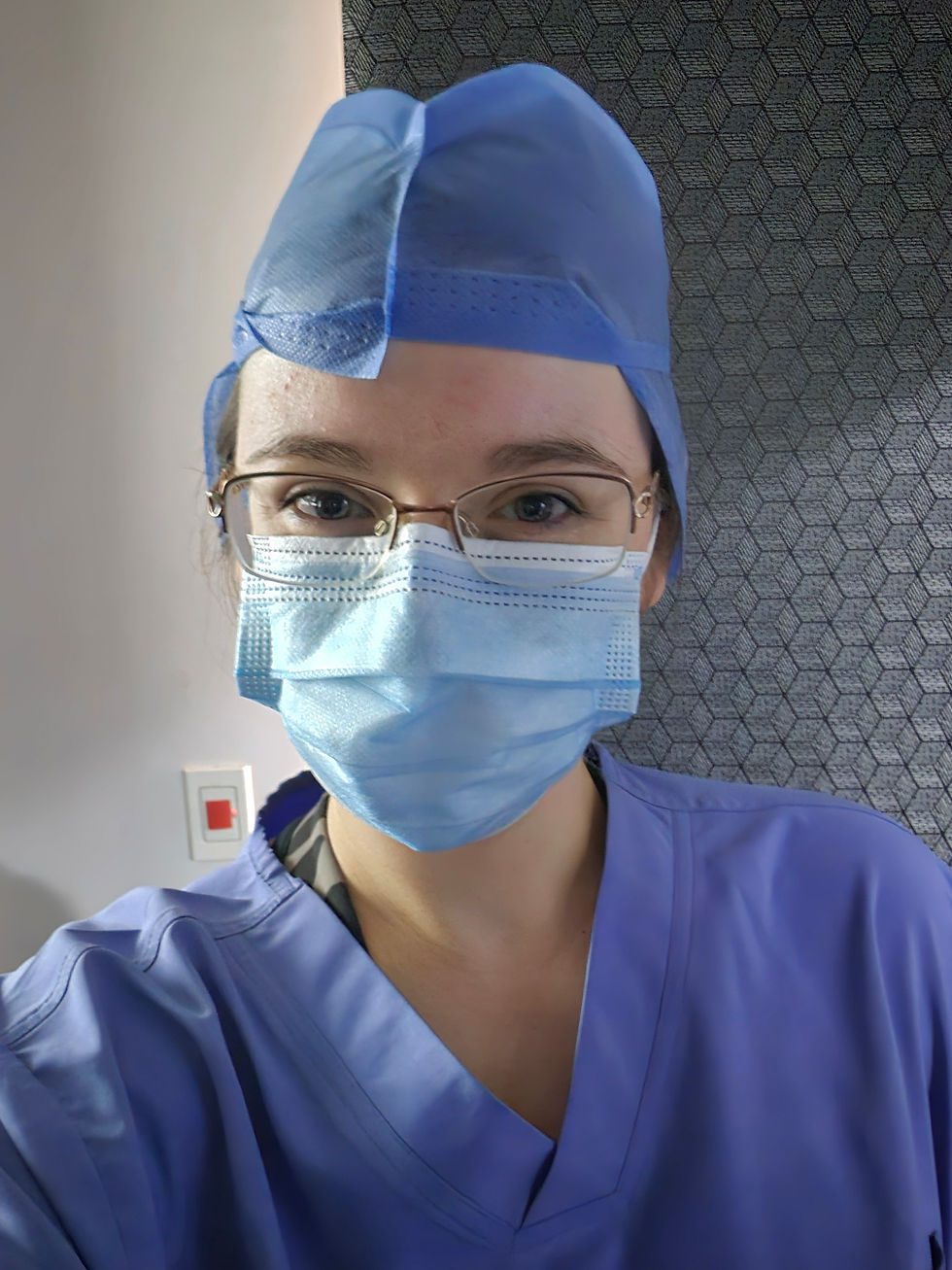My Journey at Phacohub Academy
- Martina Milkovska, FEBO
- Sep 12, 2025
- 5 min read
Updated: Sep 21, 2025
Martina Milkovska shares her experience with phaco training at PhacoHub Academy.
When I finished residency, I began performing cataract surgery on my own, excited yet slightly afraid. Aware of the possible complications and without a mentor to call in a crisis, I sought a way to turn fear into a skill.
Seeking Advanced Training at PhacoHub
I had already trained at Agarwals Eye Hospital in India, where I gained valuable experience with both basic phacoemulsification and extracapsular cataract extraction. Still, I knew I needed the next level: structured, complication-focused training with real mentorship. That is when I read about Phacohub Academy in Cairo in Ophthalmology24.
I reached out to international colleagues who had trained there and received excellent feedback. Encouraged, I contacted Phacohub directly and planned a seven-day intensive surgical course, becoming the first Bulgarian ophthalmologist to train there.

The Best Time in Cairo Without Even Seeing the Pyramids
Arrival in Cairo
Traveling from Bulgaria to Cairo required a transit through Istanbul, with a total flight time of approximately four hours. Upon arriving in Cairo, I stayed at a hotel near Eljazira Eye Center, one of the two sites where surgeries were performed. The other location, Barrada Eye Center, was just a 15-minute walk away.
Intensive Surgical Training
My mentor, Dr. Ahmed Naggar was a remarkably talented surgeon with vast experience despite his young age. What struck me most was not only his skill but also his approach to training.

He understood my goals from the very beginning and tailored everything to match them. His team impressed me immediately. They were not only excellent surgeons but also natural teachers, with an intuitive sense of when to step in and when to let me face a challenge myself.
We began with straightforward cases and gradually advanced to more complex situations: white and brunescent cataracts, small pupils, and deliberate complication exercises.
Before each case, Dr. Naggar would give me clear instructions – what to focus on, what to practice. Then watch as I carry out the steps. Practicing complication management in such a controlled and supportive environment was an experience that reshaped the way I approach surgery.

Expanding Surgical Skills
By my third day, I was performing more than ten cataract surgeries per day. Between cases, I also began doing PRK procedures, as well as a few pterygium excisions and trabeculectomies.
I even attempted the Yamane scleral fixation technique. The variety kept the training dynamic and allowed me to gain confidence in handling different types of anterior segment surgeries.

Venturing into Vitreoretinal Surgery
On the fourth day, I stepped into uncharted territory – the vitrectomy operating room. I began by observing two surgeries performed by Dr. Naggar, before it was my turn.
Although I had never performed a vitrectomy before, I had observed many. To my surprise, once I sat down at the microscope, everything felt natural. It was as though I unlocked a new level of my surgical potential. What amazed me most was how much I enjoyed this type of surgery. The sensation of working inside the vitreous cavity, so close to the retina, was incredible.
Adrenaline rushed through my veins, my hands were steady, my mind completely focused – nothing else mattered. Vitreoretinal surgery carried an intensity that was both challenging and exhilarating, and I quickly realized how much it suited me. The feeling was completely different from phacoemulsification, which has its own rhythm and satisfaction.
Over the next days, I had the chance to perform several basic vitrectomies from start to finish, as well as manage complex situations such as dropped IOLs and dropped nuclei or nuclear fragments. I practiced both implanting and evacuating silicone oil – not because I expect to encounter such cases in my own practice, but as a way to build confidence in the vitrectomy steps themselves.
RELATED: Vitreoretinal Courses Worldwide

Learning from Observation and Mentorship
Dr. Naggar gave me guidance that has stayed with me even after my training. He encouraged me to observe carefully, saying, ‘If you see well, you do well.’ He emphasized that attention to detail and careful observation are the foundation of surgical skill.
He also urged me to practice as much as possible and to believe in myself, reminding me that confidence built through experience is essential. Following his advice, I not only watched his surgeries closely but also observed other trainees with great interest, to see different surgical styles and to learn from their mistakes.

By carefully following their cases, I began to recognize potential errors before they occurred and witnessed firsthand how the mentors guided them through complication management. This experience sharpened my own ability to anticipate problems and deepened my understanding of surgical decision-making.
Life Beyond the Operating Room
The days were long and intense – we often stayed in the operating room from 10 a.m. until 10 p.m., and sometimes past midnight. Hours of continuous surgery with maximum concentration are mentally and physically demanding, and even though I was sleeping well, I felt exhausted. It took some time to get used to this intensity, but every moment was worth it for the learning and growth I experienced.

Despite the demanding schedule, there was time for connection. After surgery, Dr. Naggar often invited me to join him, other trainees, or his colleagues for dinner. These evenings made me fall in love with Egyptian culture – the hospitality, the vibrant atmosphere, and, of course, the delicious food.
Lessons and Advice for Young Ophthalmologists
My time at Phacohub Academy was more than just surgical training. It was a transformation in the way I approached surgery. What made the experience unique was the combination of volume, variety, and mentorship. The structured exposure to complications in a safe environment taught me lessons that no textbook or isolated surgical practice could provide.
For young ophthalmologists, my advice is this:
Seek out structured, intensive training, especially in environments where complication management is part of the curriculum.
Don’t be afraid to step into the unknown. Watching is not the same as doing, and sometimes you only discover your potential once you’re holding the instruments.
Find mentors who guide, not overshadow. A good teacher knows when to let you try and when to step in.
RELATED: Ophthalmology Observership Grants

Reflection and Transformation
When I first arrived in Cairo, I was insecure about my skills and afraid of complications. By the time I left, I felt not only more competent but also more confident in my ability to handle the unexpected.
Phacohub gave me exactly what I was looking for: the chance to grow, to fail safely, to learn deeply, and to discover new passions within ophthalmic surgery. For me, it was a turning point in my career and an experience I wholeheartedly recommend to any young ophthalmologist seeking to master their craft.

ABOUT THE AUTHOR
Martina Milhovska, M.D., FEBO, is an ophthalmology specialist from Bulgaria with a strong commitment to patient care and continuous professional development. She has trained both locally and internationally, participating in specialized courses and clinical observerships to enhance her expertise.







